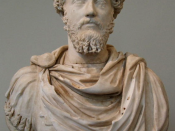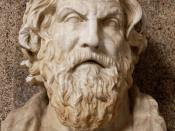Compared to the leaders of Greek thought and philosophy like Socrates, Plato and Aristotle, the Stoics are considered by many as representatives of a philosophical system of deuterogenic importance. Stoicism revisited Pre-Socratic theories, Plato, Aristotle and even Cynicism. A shared view among the modern analysts of philosophy and particularly Plato is that Stoicism is a stone idol of the teachings of Plato. This is a continuation of the notions of the 19th century scholars, that viewed symptoms of decadence in everything that was chronically distant from the classical period and into the Hellenistic period and of course, the years of the Roman rule.1
Roots and Evolution of the Stoa
The system of thought that Stoa formed beginning with Zeno towards the end of the 4th century B.C. was later continued by Cleanthes and Chrysippus. It was perfected in the 3rd century and richened by Seneca and Marcus Aurelius. By no means must this school of thought be considered as a bad copy of a glorious past.
Stoicism like almost all Hellenistic philosophies is objectively closer to the frame of mind of the modern thought much more than the classical realism of Plato. Historically speaking Stoicism influenced public life from the Hellenistic period to the last century of the Greco-Roman world, having direct impact in science, politics as well the theoretical and ethical thought in general. Most importantly, Stoicism bleed into the teachings of Christian belief, both Seneca and Epictetus were considered Christians by nature. Even though that during the medieval ages the effects of Stoicism was non-existent (like everything else) with the coming of the renaissance Stoic thought came back in the spot light. The arguments about natural theology and natural law are placed according to the terms of the Stoa. From Cartesious to Hume Stoic ethics and epistemology are...


